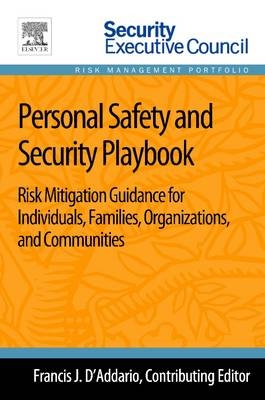
Personal Safety and Security Playbook
Elsevier Science Publishing Co Inc (Verlag)
978-0-12-417226-5 (ISBN)
The Personal Safety and Security Playbook is designed for anyone who may benefit from shared community safety and security responsibilities. Chapters are organized by areas of concern, from personal risk awareness to protection and security considerations for family, home, travel, and work. The guidelines included help the reader recognize personal safety and security hazards, take proactive prevention steps, and react reasonably to danger with beneficial outcomes.
A full chapter of local and national resources for personal security is included at the end of the Personal Safety and Security Playbook.
The Personal Safety and Security Playbook is a part of Elsevier’s Security Executive Council Risk Management Portfolio, a collection of real world solutions and "how-to" guidelines that equip executives, practitioners, and educators with proven information for successful security and risk management programs.
Francis is a seasoned all-hazards risk mitigation leader for multinational convenience, food and beverage, manufacturing, restaurant, retail, and supply chain operators. He has served as chief security officer for Starbucks Coffee, Hardees Food Systems, and Jerrico Inc. His expertise includes risk diligence, loss prevention and mitigation systems design, as well as contribution analytics. Francis was named as one of the top 25 "Most Influential People in Security" of 2009 by Security magazine, and was a CSO magazine 2007 Compass Award honoree.He is also the critically acclaimed author of Not a Moment to Lose…Influencing Global Security One Community at a Time (2010), The Manager’s Violence Survival Guide (1995), and Loss Prevention through Crime Analysis (1989).
Executive Summary
What Is a Playbook?
Introduction
Chapter 1. Preventing and Reporting High-Risk Events
1.1 Overview
1.2 Crime Prevention and Hazard Mitigation
1.3 Conflict Management
1.4 Mediation and Negotiation
1.5 Reporting Crimes and Emergencies
1.6 Victim’s Assistance and Rights
1.7 Using Available Resources
Chapter 2. Personal Protection
2.1 Overview
2.2 At Home
2.3 Domestic Violence
2.4 Obscene, Threatening, Harassing, and Inappropriate Communications
2.5 Stalking Behavior
2.6 If You Live in a Rural Setting
2.7 When You are Driving
2.8 Completing Errands
2.9 Going Out for Entertainment
2.10 When You Travel Out of Town
2.11 Hotel Security
2.12 During the Holidays
2.13 At Work
2.14 Street Solicitors and Panhandlers
Chapter 3. Assault and Sexual Assault
3.1 Overview
3.2 Develop a Personal Strategy
3.3 Reducing Your Risk
3.4 Self-Defense
3.5 Rape
3.6 Date Rape
3.7 High Schools and College Campuses
3.8 Protecting Children
3.9 If You Have Been Assaulted
Chapter 4. Children
4.1 Overview
4.2 Abduction, Kidnapping, and Runaways
4.3 Day Care, Schools, and Playgrounds
4.4 Home Alone: Latchkey Children
4.5 Sexual Assault
4.6 Suicide
4.7 Vandalism
4.8 Weapons
4.9 Drugs
4.10 Away at College
4.11 Gangs
Chapter 5. Home Safety and Security
5.1 Overview
5.2 Home Safety and Security Survey
5.3 Doors and Windows
5.4 Exterior
5.5 Operation Identification
5.6 Neighborhood Watch
Chapter 6. Workplace Safety and Security
6.1 Overview
6.2 Risk Mitigation
6.3 Inappropriate Communications
6.4 Working Before and After Business Hours or On Assignment
6.5 Parking Your Car
Chapter 7. When You Travel
7.1 Overview
7.2 Planning Your Trip
7.3 Automobiles
7.4 Hotel Security
7.5 Airports
7.6 International Travel
7.7 Visiting the United States
7.8 Preparing to Live Outside the United States
Chapter 8. Automobiles
8.1 Overview
8.2 Theft
8.3 When You are Driving
8.4 Parking Your Car
8.5 Carjacking
8.6 Other Hazard Mitigation
Chapter 9. Locks and Alarms
9.1 Overview
9.2 Door Locks
9.3 Window Locks
9.4 Alarm Systems and Security Surveillance
9.5 Selecting an Alarm Company
9.6 Building Codes
Chapter 10. Lighting
10.1 Overview
10.2 General Guidelines
10.3 Residential Lighting
10.4 Security Lighting
Chapter 11. Drug and Alcohol Abuse
11.1 Overview
11.2 Education and Awareness
11.3 In the Workplace
11.4 Children and Other Family Members
11.5 Community Action
Chapter 12. Seniors
12.1 Overview
12.2 General Tips to Increase Your Safety
12.3 At Home
12.4 When You are Walking, Running Errands, or Going Out
12.5 Protecting Your Money and Financial Security
Chapter 13. Fraud
13.1 Overview
13.2 Telephone
13.3 Mail
13.4 Investment Schemes
13.5 Credit Cards and Checking Accounts
13.6 Medical
13.7 Stolen Identity
Chapter 14. Personal Security Resources
14.1 Local Resources
14.2 All-Hazards Preparedness
14.3 Children
14.4 Drugs and Alcohol
14.5 Preventing Bias-Motivated Violence
14.6 Victim Assistance
About the Contributing Editor
About Elsevier’s Security Executive Council Risk Management Portfolio
| Erscheint lt. Verlag | 25.10.2013 |
|---|---|
| Sprache | englisch |
| Maße | 152 x 229 mm |
| Gewicht | 250 g |
| Themenwelt | Recht / Steuern ► Strafrecht ► Kriminologie |
| Wirtschaft ► Betriebswirtschaft / Management ► Personalwesen | |
| Wirtschaft ► Betriebswirtschaft / Management ► Unternehmensführung / Management | |
| ISBN-10 | 0-12-417226-1 / 0124172261 |
| ISBN-13 | 978-0-12-417226-5 / 9780124172265 |
| Zustand | Neuware |
| Haben Sie eine Frage zum Produkt? |
aus dem Bereich


